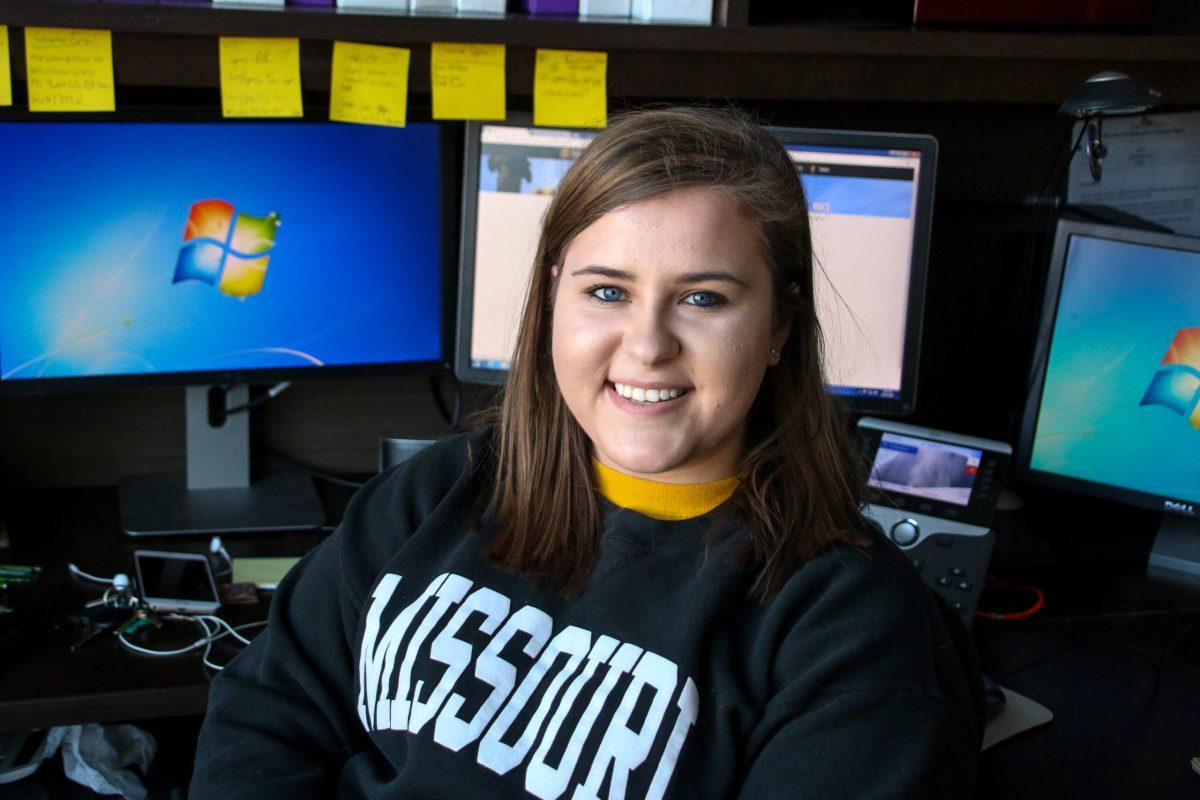She had never gotten an email back. It had been a few weeks since she entered her name and email address into the Missouri Students Association interest form on its website, and still nothing back.
A million maybes began bouncing around inside of her head.
_Maybe they don’t want me. Maybe they’re full. Maybe I’m not qualified enough. Maybe they don’t like me because I’m a freshman._
Those millions of maybes didn’t disappear until she met recently elected senate speaker Kevin Carr at MU Improv. Carr, who was pretty familiar with the ins and outs of MSA, got her involved pretty quickly.
And once she began attending meetings, she never quit showing up even after three years.
Now a senior, senate speaker Taylor Tutin manages the MSA email. She’s set it as one of her bookmarked tabs on her office computer so that logging in and responding to emails from interested students is just one click away.
“I don’t want a student to feel the way I did,” Tutin said. “I don’t want there to be like a month delay in getting back to a student who’s interested.”
Tutin believes a delay in response can lead to students losing interest and deciding not to join MSA. If she had lost interest, if she had not met Carr, she wouldn’t have her position.
What started out as one of the many informational pamphlets she received during Summer Welcome has led Tutin to an MSA career where she has not only advocated for issues she feels strongly about but also realized the power her words can truly have, shaping her into the person she is today.
But that transformation didn’t just happen overnight.
Tutin spent the first semester of her sophomore year serving as a senator on the Student Affairs Committee. As a younger senator in a committee of 12 older, more informed senators, she couldn’t help but feel intimidated to speak up.
“Leadership wasn’t always cognizant of making sure younger people’s voices were heard,” Tutin said. “I don’t think it was intentional. It was just how the committee was structured. I was a newer senator in a well-established committee.”
Tutin spent the rest of the semester attending meetings where her ideas on various projects never made it to the rectangular discussion table. Sitting in a large room where she would have to project her voice to communicate with someone on the other end of the rectangle, Tutin kept most of her thoughts to herself.
But the Academic Affairs Committee met in a much smaller room with a much smaller table. Not only did she feel more comfortable leaving her thoughts out on the discussion table, but she also felt more strongly about the cause.
Serving on the Academic Affairs Committee gave her the opportunity to “channel [her] energy to help others fulfill their academic potential, especially students who don’t have the privileges that [she’s] been afforded.”
During the spring of Tutin’s sophomore year, then-chair of AAC Tori Schafer decided to run for MSA vice president, leaving the chair position open. Somebody was needed to give a report to the senate speaker at minute meetings, and Carr thought Tutin could be that somebody.
“I don’t think I was entirely ready for that,” Tutin said. “I just wanted to lay low and do the work because I didn’t really want the position at the time.”
Her hesitancy toward the title wasn’t because of the additional workload or responsibilities that would come with assuming a higher position; it was having the title itself.
“I wanted to do the work, but I didn’t want the title,” Tutin said. “It’s almost standoffish, especially when you introduce yourself by your title.”
Tutin is against gold-plated name tags, as they eliminate the aspect of introducing yourself to the other person face-to-face. Even after she went through the confirmation process that solidified her as chair of the Academic Affairs Committee, Tutin made sure her new position didn’t impede on her approachability.
“As chair, I felt it was important being a resource to anybody, not just senators within my committee,” Tutin said. “We’re all just trying to make the student experience better and more attainable at Mizzou.”
It’s the same reason why she joined the Academic Affairs Committee in the first place. When Tutin first assumed her role as chair, she was handed the Open Educational Resources project, which aims to make class materials more accessible.
Tutin saw this project as an opportunity to advocate for an issue she feels affects many MU students.
After rebranding the project to focus more on textbook affordability, Tutin began meeting with the OER task force on how to make the best resource program at MU. Once it collected data from professors and undergraduate students on textbook costs, the group drafted a report that was used by the vice provost of undergraduate studies to create a new task force, Open and Affordable Educational Resources.
“I’m not short on things to say and I want to channel that into worthy causes,” Tutin said. “I’m really happy that the report and the task force’s work will change the lives of students.”
It’s the student experience that initially piqued Tutin’s interest in MSA. From advocating for issues concerning the MU student body to creating a comfortable environment for MSA senators, impacting the lives of students is ultimately why Tutin stayed in MSA.
Now Tutin sits in her speaker office, leaving her door open for senators and other MSA members to stop by whenever they want to work on their homework or just chat over some snacks. Whatever the occasion, Tutin is sure to be in her office, periodically clicking on her bookmarked tab to check for interested student emails.
_Edited by Skyler Rossi | [email protected]_








